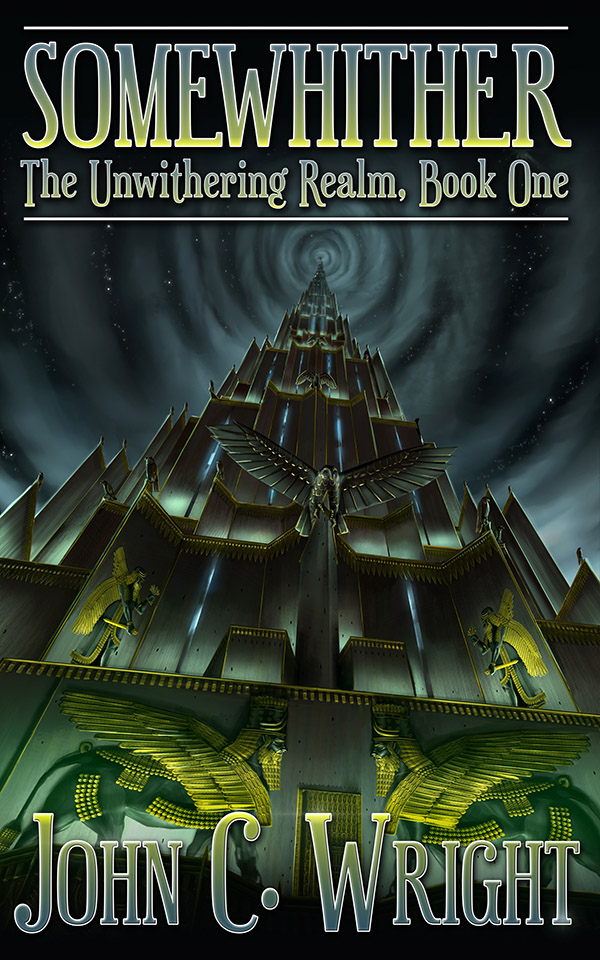We are very pleased to announce that Mr. John C. Wright has published SOMEWHITHER, The Unwithering Realm, Book One, with Castalia House:
SOMEWHITHER is the first part of A TALE OF THE UNWITHERING REALM, a new science fantasy series from science fiction master John C. Wright. It is an adventure, it is a romance, and it is a coming of age story of a young man who is not a man, in a world that is only one among many. It is a tale of a greater and darker evil with longer reach than anything Man can imagine, of despair without bounds, of pain beyond measure, and of the faith required to surmount all three. It is a story of inexorable destiny written in the stars and the stubborn courage that is required to defy it.
Ilya Muromets is a big, ugly, motherless boy who does not look like anyone else in his Oregon town. His father is often absent on mysterious Church missionary work that involves silver bullets, sacred lances, and black helicopters. Ilya works as a janitor for Professor Achitophel Dreadful of the Cryptozoological Museum of Scientific Curiosities, and he has a hopeless crush on the Professor’s daughter, Penelope, who pays him little attention and appears to be under the impression that his name is Marmoset.
One night, when Professor Dreadful escapes from the asylum to which he has been temporarily committed, he sends a warning to Ilya that not only is his Many Worlds theory correct, but those many worlds are dominated by an unthinkably powerful enemy determined to destroy anyone who opens the Moebius Ring between the worlds. And, as it happens, prior to his involuntary absence, the Professor left his transdimensional equipment in the basement of the Museum plugged-in and running….
So it is that Ilya, as he has secretly dreamed, is called upon to save the mad scientist’s beautiful daughter. With his squirrel gun, his grandfather’s sword, and his father’s crucifix, Ilya races to save the girl, and, incidentally, the world.
590 pages. No DRM. Available at Amazon and Castalia House. From the reviews:
- “I had stopped reading SF and fantasy when Stephen Donaldson got longwinded and boring (make your own jokes here) and had turned to detective fiction. But the pendulum swings. The fact that you enthused about him compelled me to give him a try, since I love your work. I can confidently say I haven`t read anything I loved this much since Lewìs` space trilogy.”
- “It is at once Star Wars, the Chronicles of Narnia, Asimov’s Robot worlds, and CS Lewis somehow rolled into one.”
I will give the gentle reader fair warning. SOMEWHITHER is crazy. The reader who described it as a “Bronzepunk Bildungsroman” wasn’t kidding. It is massive and over the top in every single way. It defines “kitchen-sink book” and there is probably not another science fiction writer alive today who could reasonably attempt a book like this. You may love it. You may find it bewildering. You may wonder if Mr. Wright should join Professor Achitophel Dreadful as an involuntary guest at the asylum. But you will definitely marvel at it.
The only way I can describe it is to imagine that Dan Brown dropped acid and was pumped full of sodium pentathol and caffeine after reading about Our Lady of Fátima. And that doesn’t even do it justice. Mr. Wright provides his own description here.
So how would I classify SOMEWHITHER? Is is high fantasy, sword and sorcery, scientific fantasy, space opera, or elf opera, or what?
It might be called an urban fantasy, in that the the tale stars a modern American boy, indeed, a Boy Scout, son of a secret agent of the parallel-world traveling Knights Templar secretly working for the Pope, who pops through a rabbit hole or Moebius wormhole, and ends up in a parallel world ruled by the Tower of Babel. Except he is from Tillimook, Oregon, which is rural rather than urban.
It might be called sword and sorcery, on the grounds that he is armed with his grandfather’s katana, a prize brought back from Japan after World War Two, so there is a sword involved, and there is definitely enough sorcery to choke a horse.
It could be called high fantasy, if we meant it reads like something inspired by a muse who had ingested a hallucinogenic drug. It is high in that sense.
SOMEWHITHER is a Christian Rock Opera, like JESUS CHRIST SUPERSTAR, but not so blasphemous, but just as stupid.
So think of SOMEWHITHER as more like GODSPELL, but if they decided to use ninjas and vampire-hunters to portray Our Lord and His apostles instead of clowns in makeup.














